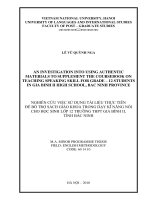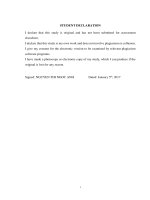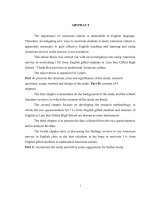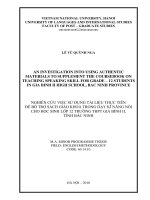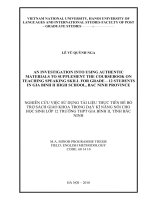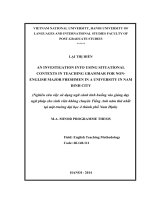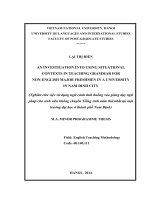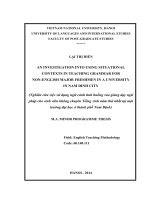An Investigation into Using Mind Mapping Strategy in Developing Speaking Skill for EFL Learners at Foreign Language Centers in Danang City
Bạn đang xem bản rút gọn của tài liệu. Xem và tải ngay bản đầy đủ của tài liệu tại đây (985.05 KB, 26 trang )
THE UNIVERSITY OF DANANG
UNIVERSITY OF FOREIGN LANGUAGE STUDIES
ại
Đ
ĐƯỜNG THỊ THÀNH
AN INVESTIGATION INTO USING MIND MAPPING
họ
STRATEGY IN DEVELOPING SPEAKING SKILL
c
FOR EFL LEARNERS AT FOREIGN LANGUAGE
à
Đ
CENTERS IN DANANG CITY
g
ẵn
N
MASTER THESIS IN EDUCATIONAL STUDIES
(A SUMMARY)
Da Nang, 2022
This thesis has been completed at University of Foreign Language
Studies, The University of Da Nang
Supervisor: Assoc. Prof. Dr. , Luu Quy Khuong
Examinar 1: Dr. Truong Bach Le
Examiner 2: Assoc. Prof. Dr. , Nguyen Van Long
ại
Đ
họ
This thesis was be orally defended at Examining Committee
Time: 11th August 2022
c
Venue: University of Foreign Language Studies
Đ
à
- The University of Da Nang
g
ẵn
N
This thesis is available for purpose of reference at :
-The University of DaNang - The center for Learning Information
Resources and Communication
-Center for Information Technology and Learning Resources, University
of Foreign Language Studies- The University of DaNang
1
CHAPTER 1 : INTRODUCTION
1.1 RATIONALE
Nowadays, many young people tend to spend much time
learning a second language, especially English. English becomes an
important subject in this global era as it promotes education in many
countries in the world. It is also considered as a foreign language in
Vietnam. One of the skills that are more likely to be paid more
attention to is speaking. Egan (1999) argues that among the four
Đ
language skills, speaking skill is at the heart of second and foreign
ại
language learning. Actually, it is as important as other skills like
họ
reading, writing and listening. However, speaking is a good example
to show how well someone does in understanding English. By
c
speaking, speakers can express their feelings, experience, desire and
Đ
perception.
à
Vietnamese students started learning English speaking skill at
N
primary and secondary school. They have to spend much time on
g
ẵn
learning phonics, vocabulary, grammar and pronunciation. It is the
fact that learning how to develop English speaking skills is so
important for EFL students. However, speaking is a challenging skill
for some students. They find difficulties to speak in English because
English language is different from their mother tongue. They have to
imitate the voice of native speakers and try to pronounce correctly.
Moreover, English vocabularies are very diverse as other languages.
One word may have two to three meanings when we put in different
contexts. It makes students confused when they do not know how to
use it in right forms and situations. Especially, children seem to learn
new words quickly but it is hard for these words to enter their long-
2
term memory. The repetition activities do not work for lower
students who have little aptitude for languages or lower language
acquisition. Therefore, the lack of vocabulary leads to trouble in
speaking English.
In addition, problem of some students is
generating idea. They have difficulties to brainstorm, generate and
organize idea when they speak in English. For example, sometimes
when the teacher asks them to speak in front of the class, they will be
confused. Students did not know how to answer their teacher’s
Đ
questions as well as communicate with their classmates naturally.
ại
Sometimes, they have an idea in their mind but do not know how to
express. Or maybe, when they have idea but they just produce a few
họ
sentences without using correct grammar.
In order to help students to solve their problems in speaking
c
English, teachers need to apply appropriate methods. Normally,
Đ
teachers often apply various effective instructional strategies to assist
à
students in learning English. One of the methods is mind mapping
N
strategy. Anna Buran & Filyukov (2015: 218) state that “Using mind
g
ẵn
maps in teaching and learning English will be useful for both
teachers and students as the amount of information is increasing
every second and our brain, which does not work in a linear way that
cannot perceive even a small part of it”. However, MMS is almost
always applied in writing activities while its application in speaking
activity is rather limited. Moreover, teachers would rather apply
mind mapping for high school, university students than for young
EFL learners because they think that high school and university
students can understand and use MMs effectively.
The aforementioned reasons have given me the urge to carry
3
out this research paper entitled “An Investigation into Using Mind
Mapping Strategy in Developing Speaking Skill for EFL
Learners at Foreign Language Centers in Danang City”. This
piece of research figures out the perception of EFL learners about the
mind mapping strategy. The author surveys the difficulties that the
EFL learners at Foreign Language Centers faced while they are
speaking English and find out the solutions for using mind mapping
to increase student’s ability in speaking English at ELT class.
Đ
1.2 AIMS AND OBJECTIVES
ại
1.2.1 AIMS
This study aims to investigate the use of MMS in developing
họ
speaking skills for EFL learners in Foreign Language Centre in
Danang city; investigates about the learner’s perception about MMS;
c
figures out the difficulties that the EFL learners face while applying
Đ
MMS and examine learners’ reflection on the benefit of applying
à
MMS in speaking English at EFL classes .
N
1.2.2 OBJECTIVES
g
ẵn
The study aims to achieve the following objectives:
- Clarify main concepts about mind maps, mind mapping and
mind mapping strategy.
- Investigating perception of EFL learners about applying
MMS in learning English speaking skill.
- Synthesizing, analyzing and evaluating experimental results
about applying MMS in teaching and learning lessons of speaking
skills directly applying experiment using MMS and not using MMS.
- Investigating the difficulties that EFL learners when using
MMS in developing their English language speaking skills
- Investigating the learners’ reflection on the benefit of
4
applying MMS in speaking
- Proposing solutions and ideas related to the application of
MMS in improving the English speaking ability of language learners.
1.3 RESEARCH QUESTIONS
In order to achieve the aims and objectives of the study, the
following questions are set:
1. What are the perceptions about
using MMS in improving
speaking skill of EFL learners at Foreign Language Centers in
Đ
Danang city?
ại
2. What are difficulties EFL learners face when
using MMS
in developing their English language speaking skill?
are EFL learners’ reflections on the benefits of
họ
3. What
applying MMS in speaking?
c
1.4 SIGNIFICANCE OF THE STUDY
Đ
1.5 SCOPE OF THE STUDY
à
N
1.6 ORGANISATION OF THE STUDY
The research consists of five chapters as follows
g
ẵn
Chapter 1 briefly introduces the rationale, presents the aim
and objectives, research questions, significance, the scope of the
study and the organization of the study.
Chapter 2 mentions the review of previous studies and the
theoretical foundation for the study and offers definitions of the key
terms
Chapter 3 talks about methods that were conducted to figure
out the difficulties that the EFL primary school students face while
they are speaking English and finds out the solutions for using mind
mapping to increase student’s ability in speaking English at ELT
5
class. This chapter presents detailed descriptions of the research
design, research methods, participants, data collection, data analysis,
and the validity and reliability of the study.
Chapter 4 reports and discusses the results of the study.
Chapter 5 is the conclusion of the research, sums up the main
findings, provides some strategies for teachers, presents implications,
the limitations of the study, and recommendations for further
research are discussed.
ại
Đ
c
họ
à
Đ
g
ẵn
N
6
CHAPTER 2 : LITERATURE REVIEW AND
THEORETICAL BACKGROUND
2.1 LITERATURE REVIEW
Speaking is one of the important basic skills in learning
English. According to Hedge (2003), learning speaking is very
important for students. Most learners figure out how to understand
and speak English before they comprehend how to write and read the
Đ
language. Thus, the spoken English is usually learned first and later
followed by other skills like reading and writing skills. Speaking is
ại
the essential skill of communication and very difficult in nature as it
họ
does not only rely on the ability to speak but also includes other
varying components such as vocabulary, grammar, pronunciation,
c
fluency and comprehension. Those aspects should be well prepared
Đ
in order to have good speaking ability.
à
In this part, the writer dealt with the previous researchers
N
applying MMS in teaching English. Nurhayati (2010. 235) stated
g
ẵn
“The learners like and feel more confident using MM in storytelling
that facilitate or help them in speaking.” It can be said that in the
speaking class, MMS can improve the students’ speaking skills. The
students do not think that speaking class is hard subject because MM
helps them to explore their ideas and experiences. Moreover, MMS
also has good impact on the students’ writing skills. As Aulia
Waloyo (2017: 81-82) stated that “mind mapping strategy was
effective and successful to improve the students’ ability in writing
skills, particularly in terms of gathering ideas for the target topic, and
to facilitate them in learning writing”.
Consequently, challenges in EFL instruction may be as a result
7
of many cultural and environmental factors, such as the lack of
interactive speaking environments, emphasis placed on test scores,
and foreign language anxiety (Yen, Hou, & Chang, 2015).
Furthermore, applying wrong methods in teaching and learning
styles cause many problems and effect to the efficiency of learning.
Therefore, the present study proposed to employ MMS in teaching
EFL learners speaking skill.
2.2 THEORETICAL BACKGROUND
Đ
2.2.1 Definition of Speaking
ại
From definition above the writer concludes that speaking is
one of four skills of English to express opinion, idea, thought, our
họ
feeling and etc. to the other people, with speaking the people can
communicate each other so, the people especially the students have
c
to mastery this skill because this is oral skill that very important for
learners
Đ
second language
or
foreign language
learners to
à
communication in their life. Without speaking we cannot express
N
what we want to express and it is make people difficult to
2.2.2 Aspects of Speaking Ability
g
ẵn
communicate with other and will caused bad relations.
As we can see, if the learners want to be good at speaking,
they have to practice and pay more attention to the elements which
deciding the efficiency in communication.
2.2.3 Teaching Speaking
Based on explanation above, teaching speaking is an activity
to make students as second language learner or foreign language
learner to produce their speech so, they can speak fluently and
confidently in front of people or other students.
8
2.2.4 Learning Speaking Skill
Therefore, applying suitable methods in learning English
speaking skill will help EFL leaners save their time and be more
fluent in speaking. It helps create their learning styles for both class –
learning and self-learning.
2.2.5 Definition of Mind Maps (MMs)
From the explanation above, a mind map is a diagram for
representing tasks, words, concepts, or items linked to and arranged
Đ
around a central concept or subject using a non-linear graphical
ại
layout that allows the user to build an intuitive framework around a
central concept. It is considered as an instrument in helping learners’
họ
memoring, systematizing and generating the ideas better.
c
à
Đ
g
ẵn
N
Figure 2.1: Examples of MMs 1
9
2.2.6 Definition of Mind Mapping (MM)
Mind mapping is a process for developing a visual, non-linear
representation of ideas and their relationships (Biktimirov and Nilson
2006).
According to Tony Buzan (2000), Mind mapping is an
application that gives us the meaningful information to understand in
a simple way.
Buzan (1993:59) explains that mind mapping is expression of
Đ
radiant thinking and is therefore a natural function of human mind. It
ại
is a powerful graphic technique which provides a universal key to
unlocking the potential of technique which provides a universal key
họ
to unlocking the potential of brain. It means that mind mapping is
media to help pour thoughts or ideas naturally. The mind mapping
c
can be applied to every aspect of life where improved learning and
Đ
clearer thinking will enhance human performance
à
2.2.7 The Basic Mind Mapping Steps
N
2.2.8 Definition of Mind Mapping Strategy
g
ẵn
MMS is a useful approach that helps you learn more
effectively, improves the way that you record information, and
supports and enhances creative problem solving.
2.2.9 Main Concept of Mind Mapping Strategy: Drawing
Mind Maps
There were some MMs which were made by EFL learners
after teachers implemented the MMS in the class.
Figure 2.2: Example of Drawing MMs 2 (Taken from student work)
Figure 2.3: Example of Drawing MMs 3 (Taken from student work)
Figure 2.4: Example of Drawing MMs 4 (Taken from student work)
10
2.2.10 The Advantages of Using Mind Mapping Strategy
DePorter and Hernacki (in Abdurrahman, 2008: 172) describe
that there are some advantages of using MMS, they are as follows;
1. Flexibility
2. Concentrating on the Topic
3. Increasing Comprehension
4. Enjoyment
2.2.11 The Information of iYes English Center
Đ
Iyes English Center was established in 2011. It has become
ại
one of the reliable places for English training for children, teenagers,
businesses in the locality. With many years of experience in the field
họ
of English teaching, iYes always attaches great importance to
improving the practical value of the curriculum, while constantly
c
researching and developing new training methods to help students
Đ
learn, practice more effectively and achieve high results in
à
international certification exams.
g
ẵn
N
11
CHAPTER 3 : RESEARCH METHODS AND PROCEDURES
3.1 RESEARCH METHODS
The purpose of this research was to find out the effect of using
MMS towards students’ speaking skill at English center. In order to
achieve the aim of this study, the investigation was based on such
methods as the quantitative and qualitative methods in which the
priority was given to the qualitative with data from questionnaires.
Đ
Table 3.1. Describe the survey subject as learners
class
ại
Experimental
Pre-test
Treatment by using mind
mapping strategy
Post-test
họ
Treatment by using normal
Pre-test
methods
c
Control class
without
mind Post-test
OF
SUBJECT,
PARTICIPANTS AND POPULATION
3.2.1 Subject of the research
3.2.2 Participants and Population
3.2.3 Sample
SAMPLE,
g
ẵn
N
3.2 DESCRIPTION
à
Đ
mapping strategy
3.3 RESEARCH INSTRUMENTS
3.3.1 Learners questionnaires
3.3.2 Speaking Test (Pre-test & Post-test)
3.4 DATA COLLECTION
The data collection was conducted in three months, from the
March of 2022 to by the June of 2022. The data collections were
implemented in an English language center, located in Danang city.
12
• In the first step, teacher asked EFL learners to complete the
questionnaire number one (see Appendix 1)
• In the second step, the researcher gave pre-test
• During the course, the researcher conducted the treatment
• Teacher asked EFL learners to complete the questionnaire
number two (see Appendix 2)
• The author provided the post-test
• Teacher asked EFL learners to complete the questionnaire
Đ
number three (see Appendix 3)
ại
3.5 DATA ANALYSIS
3.6 RESEARCH PROCEDURE
họ
Before implementing the research technique, the author
devised a strategy to ensure that the application ran smoothly.
c
There were three steps in research procedure, they were:
N
3.6.3 Reporting
à
3.6.2 Application
Đ
3.6.1 Planning
g
ẵn
3.6.4 Process of teaching mind mapping
3.6.5 Process of drawing a mind map
3.6.6 The process of developing MMS into speaking
3.7 SUMMARY
There were six sections which were mentioned in this chapter.
The first section discussed the research methods. Those were
quantitative and qualitative methods in which the priority was given
to the qualitative with data from questionnaires. The second and third
sections discussed the description of the sampling of the study and
research instruments. How data was analyzed and treated referred in
13
the fourth and fifth section in order. The final section discussed the
research procedure to show the progress of applying MMS and how
the questionnaires and tests carry out in the study.
Employing specific research methods, the thesis got the results
which related to the research questions. That would be the focus of
the next chapter. The research planned to collect and analyze the data
carefully so that the results of the study could be highly appreciated.
ại
Đ
c
họ
à
Đ
g
ẵn
N
14
CHAPTER 4 : FINDINGS AND DISCUSSION
This chapter focused on describing the result of the
implementation of mind mapping strategy in improving learners’
ability in English speaking skill. According to the research questions,
the result findings were divided into four parts.
4.1 FINDINGS
RELATED
TO
THE
RESEARCH
QUESTION ONE
Đ
4.1.1 Learners’ perceptions about using MMS
ITEMS
ại
Table 4.1: Statistics of Questionnaire Item No.1
YES
họ
1. I know mind mapping strategy
NO
20 (33%) 40 (67%)
c
2. I already applied mind mapping in learning
English speaking before.
Đ
3. I know how to draw a mind map.
20 (33%) 40 (67%)
16 (27%) 44 (73%)
à
4. I like using mind mapping strategy in
5. I apply mind mapping strategy as a
learning style.
6. I often draw mind maps to outline the ideas
before speaking
7. I find mind mapping strategy interesting
and effective.
15 (25%) 45 (75%)
g
ẵn
N
learning English speaking skills.
10 (17%) 50 (83%)
9 (15%)
48 (85%)
15 (25%) 45 (75%)
In short, most participants did not know much about the MMS.
Only small group of students already knew about this strategy and
applied in learning English. The rest of students seem they did not
15
know much and even did not apply MMS in English speaking
learning before. Some students do not like drawing so it is one of the
reason they are not interested in MMS which requires students to
draw shapes and pictures.
4.2 FINDINGS
RELATED
TO
THE
RESEARCH
QUESTION TWO
Table 4.2. Statistics of Questionnaire Item No.2
Items
YES
Đ
1. I am not good at drawing.
9 (15%)
ại
họ
2. I think applying MMS time-consuming.
c
3. MMS is not suitable for all topics.
Đ
4. I have to think too much to outline the
à
ideas
N
5. I do not know how to present smoothie and
6. I do not have chances to present ideas in
front of class
51
(85%)
51
(85%)
8 (13
52
%)
(86%)
7 (11%)
10
g
ẵn
logically in front of class
9 (15%)
NO
43
(89%)
50
(16%)
(84%)
15
45
(25%)
(75%)
Other Comments:
-draw badly
- do not have time
-not everyone pay attention to your speaking
Some students did not want to join in activities because they
found drawing MMs time-consuming or they were not good at
16
drawing. The students did not have ideas to make an outline. They
also did not know how to put the ideas and express their ideas
smoothly because they did not know the way to link between among
ideas. Some of them used wrong grammar structures. Some of
students felt too embarrassed to speak in front of the class after
making an outline.
Some of the students less paid their attention or interacted with
others in group work projects. Some of the learners with lower-level
Đ
of English obtained fewer benefits from MMS than others. In the
ại
class sizes, it was difficult for the teachers to apply productive
activities using MMS involving speaking in pairs or in groups
họ
because these activities are more demanding and time-consuming.
Hence, some of students had fewer opportunities to practice speaking
c
after drawing the outline.
Đ
Instead of only applying MMS in the class, teacher asked
à
learners to draw MMs at home to practice more. The tasks were
N
based on the content of lesson that learners learned that day.
g
ẵn
For example:
- Apply/draw MMs to systematize learned vocabulary (Figure
4.1;4.2)
- Introduce yourself (applying MMS to make an outline)
- Which country would you like to visit in the future?
(applying MMS to make an outline) (Figure 4.3)
- Doing project “Environmental Problems”
Figure 4.1: Example of Drawing MMs 9 (Taken from student work)
Figure 4.2: Example of Drawing MMs 10 (Taken from student work)
Figure 4.3: Example of Drawing MMs 11 (Taken from student work)
17
Figure 4.4: Example of Drawing MMs 12 (Taken from student work)
There was the result of the checking tasks after three months
applying MMS as homework for learners. The data was taken from
two classes in Experimental Group which were showed on Figure 4.5
and 4.6 below
60%
40%
20%
Đ
Always
0%
Often
ại
Lesson 1 Lesson 2 Lesson 3
46%
Always
Never
26%
20%
20%
20%
20%
13%
6%
c
Sometimes
53%
họ
Often
40%
Sometimes
13%
13%
Never
Đ
Figure 4.5: The frequency of applying MMS in class SK5.0
à
N
100%
g
ẵn
50%
Always
Often
0%
Lesso Lesso Lesso
Always
60%
53%
53%
Often
26%
20%
33%
Sometimes
7%
27%
14%
Never
7%
0%
0
Sometimes
Never
Figure 4.6: The frequency of applying MMS in class SK5.3
18
In short, the author found that there were some learners who
already knew about mind mapping but they did not apply it to
learning language. They sometimes saw their teachers use this
strategy at beginning of the lesson to let students brainstorm.
Moreover, teachers normally applied MMS in practicing writing
skill. Some learners did not like drawing so they did not find MMS
interesting and useful. We can see that MMS were not applied
completely before and the learners considered it as a new method.
4.3 FINDINGS
RELATED
TO
THE
RESEARCH
Đ
QUESTION THREE
ại
4.3.1 Students’ reflection on the benefits of applying mind
mapping strategy in Speaking skill.
họ
The two next steps are to evaluate students base on pre-test
c
and post-test. They consisted of the result of pre-test and post –test.
Đ
The pre-test was held on March 16th 2022. Before doing post-test the
researcher did the treatments for experimental classes, the treatments
à
were held from February 17th 2022 to June 17th 2022, and the last
N
was a post-test which was held on June 20th 2022.
4.3.3 The result of Post-test
g
ẵn
4.3.2 The result of Pre-test
From the analysis above, the writer finds that achievements in
the post -test after learners got the treatment were higher than in the
pre-test. They can consistently uses appropriate and varied
vocabulary and responds with confidence. They can recall all of the
studied vocabulary words and can speak with fluency in all
sentences. Learners can understand the meaning of all questions and
statements about over 90%.
19
4.3.4 The result of Students’ reflection
(SA: Strongly Agree, A: Agree, U: Undecided, DA: Disagree,
SDA: Strongly Disagree)
Table 4.8: Students’ reflection result
Items
Rating Scales
1.Enhance
knowledge of
25
5
(83%)
(17%)
U
DA
SDA
0 (0%)
1 (3%)
0 (0%)
0 (0%)
0 (0%)
0 (0%)
0 (0%)
0 (0%)
0 (0%)
0 (0%)
1 (3%)
2.Improve
ại
Đ
vocabulary
A
N
SA
pronunciation
4
(67%)
(20%)
(13%)
18
7
5
(23%)
(17%)
structures
English
5.Listen more
comprehensively
24
4
(80%)
(13%)
10
9
(67%)
(30%)
2 (7%)
g
ẵn
speaking
à
4.Be fluent in
(60%)
Đ
grammatical
c
3.Better use of
6
họ
and accent
20
0 (0%)
Learner’s reflection on the benefits of applying mind mapping
strategy in Speaking skill were nearly the same as that of the
teacher’s perception. More than 80% learners agreed that this
teaching strategy were very beneficial, which helped them developed
both language knowledge and skills and all of them were interested
in learning English.
20
CHAPTER 5 : CONCLUSION – IMPLICATIONS
5.1 CONCLUSION
Speaking is an important skill in English language. Learners of
English language learning should have mastered this skill. Although
speaking skill is important to communicate with each other and share
our thought, the students faced some problems such as lack of ideas,
worry make a mistake at using grammar and struggling to generate
Đ
idea while speaking. From those problems, I tried to solve it and I
MMS.
ại
was focused on developing learners’ speaking skill by applying
họ
First of all, many EFL learners have not gotten familiar with
applying MMS in learning speaking yet. Therefore, EFL learners
c
faced to some difficulties while applying MMS such as time-
Đ
consuming, drawing ability, different levels working in groups and
à
generating ideas, lack of opportunities to practice speaking in class.
N
However, after applying MMS in developing speaking skill,
g
ẵn
EFL learners agreed that MMS helped them develop both language
knowledge and skill. They were also interested in learning English
when applying MMS in learning speaking.
Based on the result of the test after applying the treatment, this
study showed that MMS could be an effective to improve learners’
speaking skill. MMS helped students to remembering the points or
vocabularies that they want to use in speaking. Learners also could
generate their idea before speaking by make a mind map. Then,
when learners finished writing their mind, they could do speaking
practice with using mind mapping. Based on those activities, learners
21
improved their performance in the second cycle.
Moreover, MMS is one of the alternative technique in teaching
English speaking skill. It increases learners’ speaking skill in some
aspect, such as, pronunciation, grammar, fluency and vocabulary.
In pronunciation, MMs gives good effect for this speaking
aspect. Learners’ pronunciation is increased by MMS. They have
good pronunciation after learned by using MM, because during their
study with MMS, they are more often to speak English in front of the
Đ
class, because mind mapping is an effective way to connect and
ại
organize our minds by doing colors, images or symbols, and
associations. So, it can help learners to plan and deliver our speech
họ
and can generate their own mind map to convey ideas to be presented
visually as supporting materials to talk about the lessons. Thus, they
c
are accustomed in speaking English. The learners could produce
Đ
English words with good pronunciation.
à
MMS also increased learners’ grammar, learners could speak
N
English with good grammatical and just a little of grammatical errors
g
ẵn
were done by learners during the researcher gave treatment. The
researcher also taught the students how to use tenses and study about
grammar. Leaners’ fluency is also increased by MMS. The learners
could speak English not in long pauses again. They did not need long
pauses to search for words of meaning and they also has unlimited
expression when they were spoke English, because learners have
representation in their minds by knowing central theme and
supporting ideas around it.
The last aspect is vocabulary. By teaching with mind mapping,
the learners’ vocabulary is increased because, when the learners
22
learned with mind mapping, they could add their vocabulary and
select the appropriate words connect with the concepts and ideas that
they want to use to express their picture. Because of many picture
that they have got and they have told, so they could produce many
new vocabularies. It can be concluded that, mind mapping technique
has significance effect on the learners’ speaking skill, and also the
implementation of mind mapping on their research was successful.
Based on the results of this study, it is hoped that the MMS
Đ
will be used more frequently during teaching and learning speaking
ại
skills. In addition, this strategy can also be used to improve the
remaining three skills, especially the writing skill. This method
họ
improves learners’ speaking skill with the hope of being more fluent
c
in communication. This research also wants to provide some
Đ
effective suggestions for applying this strategy during the speaking
à
lesson to help learners be more confident and comfortable in
N
generating ideas before speaking. It is hoped that this study could be
g
ẵn
useful for learners and teachers to limit the problems in scholarly
speaking as well as other aspects of speaking skill.
5.2 IMPLICATIONS
Based on the conclusion above, the researcher put forward the
following implication:
5.2.1 For the teachers
It is better to use mind map as one of technique to help the
students in teaching learning speaking skill, since the students not
only can improve their ability of speaking English but also make
their active and enjoyable in the process teaching learning English.
23
The teacher should be able to choose the appropriate technique
according to the skills and materials that are going to teach to the
students.
5.2.2 For the learners
It is suggested that speaking skill is an important thing in
learning language because communication is the key message to
show who you are, what you want and how valuable you are. So they
should pay more attention to speaking skill in order to make English
learning more effective.
Đ
The learners must be active and have motivation to learn an
ại
practice their English at school or out of school.
họ
5.2.3 For the other author
Other researchers are expected to do a similar research with a
c
similar topic by using a wider scope and larger population.
Đ
Therefore, the result will be more applicable in a tertiary level. The
à
writer hopes there will be some corrections and critics from the other
g
ẵn
5.3 SUGGESTIONS
N
writer who read and investigate this thesis.
Having analyzed the result of this study, it is found that mind
mapping helped the students to develop students’ speaking skill in
terms of pronunciation, grammar, fluency and vocabulary. The
researcher gave some suggestions were as follow
English teacher was suggested to use mind mapping as an
alternative way in teaching speaking. So mind mapping can
encourage the students to be more active in learning process.
The English learner were suggested to be more active, creative
and enjoy in exploring their ability in speaking by applying mind
